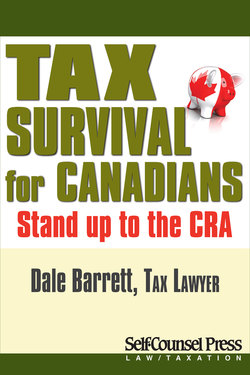Читать книгу Tax Survival for Canadians - Dale Barrett - Страница 29
На сайте Литреса книга снята с продажи.
2. Personal Income Tax Returns (T1 Return)
ОглавлениеAs noted previously in Chapter 2, a taxpayer is required to file a return if he or she owes any taxes to the CRA for the relevant reporting period, or if he or she has been requested to file by the CRA. There are also various other reasons why a taxpayer may be required to file a return:
• You owe taxes.
• CRA sends you a request to file a return.
• You and your partner (i.e., spouse or common law) are splitting pension income.
• You received Working Income Tax Benefit (WITB) advance payments.
• You disposed of capital property (e.g., you sold real estate or shares) or you had a capital gain (e.g., if a mutual fund or trust attributed amounts to you, or you are reporting a capital gains reserve you claimed on your previous year’s taxes).
• You have to repay Old Age Security or Employment Insurance benefits.
• You have not repaid money withdrawn from your registered retirement savings plan (RRSP) under the Home Buyers’ Plan or the Lifelong Learning Plan.
• You have to contribute to the Canada Pension Plan (CPP). This can apply if, for the previous year, the total of your net self-employment income and pensionable employment income is more than $3,500 (as of the time of this book’s publication).
• You are paying Employment Insurance premiums on self-employment and other eligible earnings.
If none of the above reasons apply, you may still want to file for the following reasons:
• To claim a refund.
• To claim the Working Income Tax Benefit (WITB).
• To apply for the GST or HST credit (including any related provincial credit).
• You have incurred a non-capital loss in the previous year that you want to apply in other years.
• You want to or your partner (i.e., spouse or common law) wants to begin or continue to receive the Canada Child Tax Benefits payments.
• You are carrying forward or transferring the unused portion of your tuition, education, and textbook amounts.
• To report income for which you could contribute to an RRSP in order to keep your RRSP deduction limit for future years up to date.
• To carry forward the unused investment tax credit on expenditures you incurred during the current year.
• You receive the Guaranteed Income Supplement or Allowance benefits under the Old Age Security program. You can renew your benefits by filing the return by April 30. If you miss this deadline, you will have to complete a renewal form.
In Canada, personal income tax is levied on the worldwide income of individuals considered to be Canadian residents for the purposes of income tax, and also on certain types of Canadian-source income earned by non-resident individuals.
Canadian taxpayers must file their T1 Tax Return by the due date yearly. Every year the returns are due following the completion of the calendar year on April 30. If you are self-employed, or a spouse or common-law partner of a contractor, returns are due June 15. For all returns, amounts owing must be received by the CRA on or prior to April 30 to avoid being subjected to interest charges or penalties.
Individuals may determine the amounts owing by first determining their yearly taxable income. The CRA is entitled to collect the personal income tax through a variety of means, such as the following:
• Installment payments, which certain individuals are required to make every quarter throughout the year instead of paying at the end of April following the tax year.
• Deductions at source. This is where direct deductions from the pay of an individual are remitted to the CRA.
• Voluntary payments.
• Payments obtained by CRA Collections Officers.
